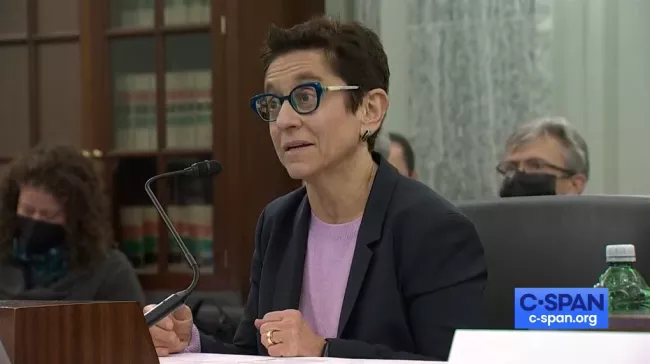 FCC nominee Gigi Sohn (Image credit: C-SPAN)
FCC nominee Gigi Sohn (Image credit: C-SPAN)
President Biden’s nominations to serve at various posts requiring Senate confirmation remain under fire. Right now, all eyes are on Supreme Court nominee Ketanji Brown Jackson. But many have not forgotten about Gigi Sohn, another of President Joe Biden’s picks under increasing scrutiny particularly in key states like Arizona, Colorado, Nevada and West Virginia.
Already extreme nominees like Neera Tanden and Saule Omarova have been defeated due to hyper-partisan combative tweets attacking Republicans by the former, and unabashed Marxism by the latter. Sohn’s nomination is no different, and key states have taken a particular interest in stopping the nomination.
The Arizona Free Enterprise Club, Colorado’s Independence Institute, Nevada’s Citizen Outreach, and West Virginia’s Commissioner of Agriculture and Former Speaker Pro Tempore of the West Virginia House of Delegates all joined a coalition letter opposing the nomination of Gigi Sohn to the Federal Communications Commission.
Arizona, Colorado, Nevada and West Virginia are all counting on the FCC to do an accurate job of judging unserved areas in its broadband maps when it comes to deploying the billions of dollars in funding for broadband expansion in the Infrastructure, Investment and Jobs Act (IJIA).
But they have plenty of reasons to be concerned that their unconnected regions will stay that way. Her statements disregarding the importance of closing the digital divide in rural areas should be of particular concern. In testimony before the House Energy and Commerce Subcommittee on Communications and Technology, she said “policymakers have focused disproportionately on broadband deployment in rural areas of the United States. Americans who live in cities also face enormous challenges to broadband connectivity … the country’s broadband adoption problem is three times higher in urban areas than rural.”
Sohn’s other favored policies would at the very least delay deployment and increase costs and, at the very worst, these regulatory barriers would still leave some areas unserved. She was one the chief architects of the short-lived Title II common carriage rules, which decreased broadband investment while increasing prices. Sohn has been clear that she not only wants to reinstate these rules, but wants to take them further, including banning free wireless data services that are particularly popular among low-income users.
Senator Krysten Sinema (D-Ariz.), a moderate Democrat from Arizona on the Senate Commerce Committee, with Jacky Rosen (D-Nev.) voted along party-lines to advance Sohn’s nomination; the vote ended in a 14-14 deadlock. For Sohn’s nomination to proceed, the full Senate must vote to discharge the stalled nomination from the committee. Although Senators Sinema and Rosen voted to move Sohn’s nomination out of committee, neither must vote for her again. Sinema’s final vote may hinge Sohn’s support for net neutrality. In 2019, Senate Democrats, except for Sinema, opposed the FCC’s moves to repeal its net-neutrality rules, stating that the agency’s moves could have unintended consequences.
Meanwhile Rosen said she supported Sohn because she promised to visit and speak with local broadcasters. That’s a promise and a duty of any FCC Commissioner but on actual paper, Sohn’s recusal agreement does not help local broadcasters. The recusal is specifically from proceeding affecting broadcasters because of her involvement with Locast, a “nonprofit” that snatched broadcaster signals out of the air, repackaged them, and for a “donation” gave account holders access with no compensation to broadcaster for their original content.
Sohn’s obvious stance against intellectual property will only harm the availability and quality of local news content. While local broadcasters are in the fight for their life against Internet platforms, Sohn spearheaded an FCC proceeding that would have enabled tech platforms to effectively steal and monetize television content without paying for usage rights. She has also expressed interest in the FCC revoking hundreds of broadcast licenses from a broadcaster editorial decision she disagrees with. She could use her FCC authority over broadcast license renewals to silence voices.
Sohn’s obvious attacks on speech and those on the other side of the isle are serious problems Senators should consider. West Virginia Commissioner of Agriculture, Kent Leonhardt asked Senator Joe Manchin (D-W.Va) to hold the line against radical nominees from President Biden and to hold the administration to a higher standard for federal nominations, saying “The FCC should be an independent, unbiased government agency that works to help Americans access the resources to communicate with each other, no matter their political, cultural, or social backgrounds. The possibility of a figure as polarizing and dubious as Gigi Sohn, directly undermines the FCC’s ability to insulate itself from political bickering and do its jobs across the country and particularly in West Virginia.”
Sohn is not focused on the items that are most important to the residents of these states, but more interested in attacking officials she disagrees with, and hyper-partisan polices like net neutrality and municipal broadband. If that is not enough, the ethical issues stemming from her obfuscation of Locast settlement details and a subsequent recusal agreement that will call all her rulings into question disqualify her from being a proper nominee to serve the FCC.
Senators Kyrsten Sinema (D-Ariz.), Mark Kelly (D-Ariz.), John Hickenlooper (D-Colo.) Michael Bennet (D-Colo.), Jacky Rosen (D-Nev.), Catherine Cortez Masto (D-Nev.), Joe Manchin (D-W.Va), and Shelley Moore Capito (R-W.Va) should take notice and oppose the confirmation of Gigi Sohn to serve as Commissioner at the Federal Communications Commission.

